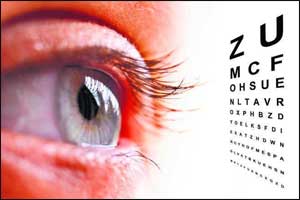- Home
- Editorial
- News
- Practice Guidelines
- Anesthesiology Guidelines
- Cancer Guidelines
- Cardiac Sciences Guidelines
- Critical Care Guidelines
- Dentistry Guidelines
- Dermatology Guidelines
- Diabetes and Endo Guidelines
- Diagnostics Guidelines
- ENT Guidelines
- Featured Practice Guidelines
- Gastroenterology Guidelines
- Geriatrics Guidelines
- Medicine Guidelines
- Nephrology Guidelines
- Neurosciences Guidelines
- Obs and Gynae Guidelines
- Ophthalmology Guidelines
- Orthopaedics Guidelines
- Paediatrics Guidelines
- Psychiatry Guidelines
- Pulmonology Guidelines
- Radiology Guidelines
- Surgery Guidelines
- Urology Guidelines
FDA approves first Prosthetic Iris

The US Food and Drug Administration approved the first prosthetic iris to treat patients with aniridia or other damages to the eye. The surgically implanted device can be used for both children and adult. More than 70 percent of patients reported significant decreases in light sensitivity and glare as well as an improvement in health-related quality of life following the procedure. In addition, 94 percent of patients were satisfied with the artificial iris appearance.
Congenital aniridia is a rare genetic disorder characterized by the complete or partial absence of the iris. The iris controls the amount of light entering the eye, and those with aniridia have a sensitivity to light and other severe vision problems.
"Patients with iris defects may experience severe vision problems, as well as dissatisfaction with the appearance of their eye," said Malvina Eydelman, M.D., director of the Division of Ophthalmic, and ENT Devices at the FDA's Center for Devices and Radiological Health. He added "Today's approval of the first artificial iris provides a novel method to treat iris defects that reduce sensitivity to bright light and glare. It also improves the cosmetic appearance of the eye in patients with aniridia."
The CustomFlex Artificial Iris(CFAI) is made of thin, foldable medical-grade silicone and is custom-sized and colored for each individual patient. A surgeon makes a small incision, inserts the device under the incision, unfolds it and smooths out the edges using surgical instruments. The prosthetic iris is held in place by the anatomical structures of the eye or, if needed, by sutures.
In addition to congenital aniridia, the CFAI is indicated to treat iris defects due to other conditions like albinism, traumatic injury or surgical removal due to melanoma.
CFAI got FDA approval after a non-randomized clinical trial of 389 adult and pediatric patients with aniridia or other iris defects. The study measured patients' self-reported decrease in severe sensitivity to light and glare post-procedure, health-related quality of life, and satisfaction with the cosmetic improvement or appearance of the prosthesis.
Some complications were noticed during the study which included movement or dislocation of the device, strands of device fiber in the eye, increased intraocular pressure, iritis, synechiae and the need for secondary surgery to reposition, remove or replace the device. Complications associated with the surgical procedure included: increased intraocular pressure, blood leakage in the eye, swelling of the center of the retina (cystoid macular edema), secondary surgery, corneal swelling, iritis, and retinal detachment.
The CustomFlex Artificial Iris is contraindicated uveitis, microphthalmos, untreated retinal detachment, untreated chronic glaucoma, cataract caused by rubella virus, rubeosis, certain kinds of damaged blood vessels in the retina, and intraocular infections. It is also contraindicated in patients who are pregnant.
The CustomFlex Artificial Iris was approved through a premarket approval application (PMA). A PMA approval is primarily based on a determination by the FDA that the PMA contains sufficient valid scientific evidence that provides reasonable assurance that the device is safe and effective for its intended uses.
CustomFlex Artificial Iris was granted Breakthrough Device designation. To qualify for such designation, a device must provide for more effective treatment or diagnosis of a life-threatening or irreversibly debilitating disease or condition, and meet one of the following criteria: the device must represent a breakthrough technology; there must be no approved or cleared alternatives; the device must offer significant advantages over existing approved or cleared alternatives; or the availability of the device is in the best interest of patients.

Disclaimer: This site is primarily intended for healthcare professionals. Any content/information on this website does not replace the advice of medical and/or health professionals and should not be construed as medical/diagnostic advice/endorsement or prescription. Use of this site is subject to our terms of use, privacy policy, advertisement policy. © 2020 Minerva Medical Treatment Pvt Ltd